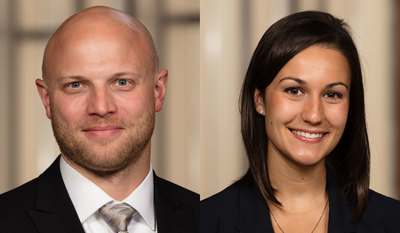
A non-descript stairway opens to the second-floor lobby of the Innovation Center.
Beyond the closed door on the southern wall is a corridor lined with white frosted glass walls, sprinkled with scribbled color. The colors are ideas, brainstorming scrawled art giving the whole floor a feeling of excitement.
This hallway is the first of several planned wings at Innovation Park, the beginning of the IDEA Center at Notre Dame, only seven months old.
On a windy day in early September, fellow student Bernardo Jaccoud introduced me to Charles Powell, the program manager for student engagement at the IDEA Center. Notre Dame has a rich history of giving students extraordinary opportunities, but no alumni explanation prepared me for the adventures within the hallways at the IDEA Center.
A couple weeks after this initial meeting, I interviewed for an Entrepreneurial Lead (EL) Internship. The job title (and description) do not scratch the surface of the job’s potential. “It’s very entrepreneurial around here. Be ready for self-starting and ambiguity,” my interviewer warned.
A few days later, my classmate Danielle Molyet expressed interest in getting involved. “I’m looking for an experience where I can step out of my comfort zone, cross-train in a field in which I have little expertise, and become thought partners with some of the best and brightest,” she said. A few minutes into her conversation with Powell, she knew this experience was the right fit.
From there, Danielle and I hit the ground running. Our assignment was to research, conduct interviews and supply analysis to support the strategic planning for a future product offering from a Notre Dame support venture. As students of business, risk management and strategic planning, what Danielle and I learned was nothing short of transformational.
Allow me to back up a little.
The IDEA Center at Notre Dame is the incubation engine tasked with supporting student, faculty and community startup business ventures. Broadly speaking, IDEA Center engagements fall into three categories: pre-validation ventures, de-risking ventures, and launching ventures. We played a role in the “de-risking” portion of the processes for our client. Since the principle framework of de-risking elements of a sales model is transferable between industries, products and management teams, our post-MBA careers will surely benefit from this experience regardless of which direction we take.
Bryan Ritchie, executive director of the IDEA Center, and his lieutenant, Matt Gardner, structure the “de-risking” processes to rigorously evaluate business models and inform potential investors (including funds available through the center itself). Based on our conversations with other ELs, the whole system mints successful project outcomes by building strong datasets, facilitating strategic decisions.
Specifically, for our project, we were tasked with uncovering pains experienced by marketing professionals at the manager, director and vice president levels. Simply speaking, we wanted to learn what causes the most operational frustration in the day-to-day work of marketers. The project began by evaluating the strategic needs and scoping the preliminary investigation. Danielle and I met with the business interest, built an understanding of their needs, and launched an interview campaign. We collaborated with other IDEA Center resources, such as Alumni Relations via Karen Deak, and brought on additional student resources, including fellow student Eamon O’Connor, who helped us reach out to more than 300 marketer decision makers. Thanks to the enthusiastic support of Notre Dame alumni and the school brand, we achieved an email campaign engagement rate of over 25%. Danielle and I interviewed more than 80 marketing professionals, revised interview strategies and produced weekly updates for the team. By the end of the project, we had mastered our abilities to translate one-on-one conversational material into precise, quantitative information compatible for analysis with a broader data set. Not to mention, we also “cross-trained” in the field of marketing, picking up the experiential language of marketers without the need for academic textbooks.
Further, these interviews resulted in multiple data mining and analysis opportunities, refining strategic questions and revising the value proposition hypothesis. The process brought clarity to our client’s product offering strategy, and we helped ideate the next steps for the business model. How many schools can show student strategic involvement in bona fide startup funding decisions?
Notre Dame is truly a leader in experiential education within the entrepreneurial ecosystem.
Skills Learned:
- Email campaign design and execution
- Qualitative interview question design and delivery
- Strategic listening
- Iterative assessment of interview data
- Continuous improvement of interview process/questions
- Qual-to-Quant data evaluation
- De-risking startup problem statement and market fit